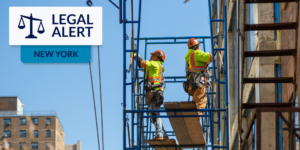
New York Governor Kathy Hochul signed NY A-3350 into law on September 6, 2021. The effect of such legislation will make prime contractors on certain types of construction projects liable for actions by subcontractors of any tier regarding wage and/or benefit violations.
Here’s a quick overview of what New York contractors need to know when this legislation goes into effect in 2022.
New York’s new construction industry wage theft laws
Over Labor Day weekend, Gov. Hochul enacted A-3350 which we’ve covered in a previous Levelset Legal Alert:
This new legislation will hold contractors (which includes general/prime contractors, construction managers, joint ventures, or any combination thereof) jointly and severally liable for wage theft claims by subcontractors on construction projects.
Applicability of new wage theft laws
This new legislation applies to nearly all construction contracts entered into, renewed, modified, or amended on or after January 4, 2022.
The exceptions to this law include certain residential projects — such as home improvement contracts for owner-occupied dwellings — and the home construction contracts for 1-2 family dwellings (except where the contract results in the construction of more than 10 1-2 family, owner-occupied dwellings at one project site annually).
Furthermore, these rights may not be waived through any contractual provisions. However, they may be waived by a collective bargaining agreement with a bona fide building and construction trade organization as long as the waiver explicitly references the statutes.
Types of claims covered
A contractor’s liability will obviously cover claims by subcontractors and/or workers for unpaid wages. However, it also includes claims for wage supplements, which includes reimbursement for expenses, health, welfare, and retirement benefits, and any outstanding vacation, separation, or holiday pay as well.
The timeframe (statute of limitations) for subcontractors to bring such claims against the contractor is three years, as opposed to the statute of limitations for claims against an employer which is six years.
Available remedies for violations
The remedies available for subcontractors include the following:
- Costs and attorney fees
- Expenses not to exceed $50
- An amount no more than 100% of the total amount of unpaid wages as liquidated damages
- 300% (treble) damages for willful violations
- Prejudgment interest
- Max of $5,000 penalty plus costs & attorney fees for failure to provide Wage Theft Prevention Act Notice under §195(1)
- Max of $5,000 penalty plus costs & attorney fees for failure to provide complaint statements under §195(3)
Requests for information
A new statute was also added to the General Business Law under §756-f. This provision allows contractors to audit a subcontractor’s payroll records and practices to safeguard against such claims.
Upon request, a subcontractor must provide a copy of their certified payroll records. A contractor can also request a list of the subcontractor’s workers (including independent contractors), their anticipated contract start date, the scheduled duration of the work, and the sub’s local union contact information (if applicable).
A subcontractor’s failure to comply with such requests in a timely fashion constitutes a proper basis to withhold payments.
How NY contractors can protect themselves
Under this new legislation, a contractor’s exposure to liability is greatly increased. So contractors must be particularly vigilant when it comes to ensuring payment down the contracting chain. The use of the requests for information to properly audit payment practices on a project is crucial.
Additionally, there is nothing contained in the new provisions that preclude the ability to add indemnification provisions in their subcontracts. As long as they don’t waive or otherwise hinder their rights under the new wage theft laws. This is clearly a costly and burdensome task for contractors, but the additional costs may be well worth it if they are found liable for any wage violations.